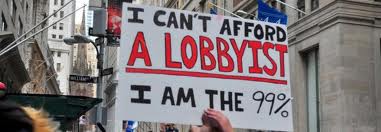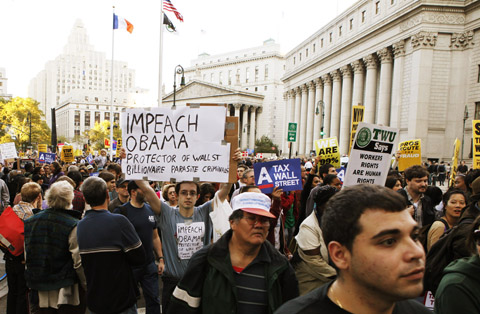What Do They Want? Justice
October 6, 2011
By Robert Scheer
How can anyone possessed of the faintest sense of social justice not thrill to the Occupy Wall Street movement now spreading throughout the country? One need not be religiously doctrinaire to recognize this as a “come to Jesus moment” when the money-changers stand exposed and the victims of their avarice are at long last offered succor.
Not that any of the protesters have gone so far as to overturn the tables of stockbrokers or whip them with cords in imitation of the cleansing of the temple, but the rhetoric of accountability is compelling. “I think a good deal of the bankers should be in jail,” one protester told New York Times columnist Andrew Ross Sorkin. That prospect has evidently aroused concern in an industry that has largely managed to escape judicial opprobrium.
“Is this Occupy Wall Street thing a big deal?” the CEO of a major bank asked Sorkin. “We’re trying to figure out how much we should be worried about all this. Is this going to turn into a personal safety problem?”
It should pose a threat, not because peaceful demonstrators will suddenly morph into vigilantes fatally damaging their cause with violent action, but rather because government prosecutors should fulfill their obligation to pursue justice and incarcerate some of the obvious perps. As Sorkin conceded, in one of the rare instances of the business press attempting to understand the protesters: “the message was clear: the demonstrators are seeking accountability for Wall Street and corporate America for the financial crisis and the growing economic inequality gap.”
Sorkin ended his account with snarky comments about the protesters using ATM machines and about the ever-admirable Code Pink founder Jodie Evans having flown a commercial airline to get across the country to the demonstration. He also offered the predictable dismissal that could be made about any genuinely spontaneous movement, that “the protesters have a myriad of grievances with no particular agenda.”
But ignore the mass media’s nitpicking and mostly derisive coverage and wonder instead why it took so long for this grass-roots movement to emerge as an alternative to the tea party, which exonerates the thieves of Wall Street. With 25 million Americans unsuccessfully looking for full-time work, 50 million experiencing mortgage foreclosure and an all-time high of 46.2 percent living in poverty, including 22 percent of all children, isn’t it logical that the faux populism of the tea party be confronted with a progressive alternative?
The Republican narrative, which the media have treated with considerable respect, blames “big government” for our ills, not when Washington bails out the banks, or feeds the maws of the military-industrial complex, but only when it might go to the aid of the victims of the financial conglomerates.
It was the Wall Street lobbyists, with the complicity of Democrats and Republicans in Congress, who caused the Great Recession by destroying a sensible regulatory system — one that had kept U.S. banking reliable since the Great Depression — and by legalizing the securitization of homes. But the Wall Street titans escaped being held accountable for the excesses of their greed: They got their lackeys in government to throw them a lifeline bailout while their victims among the unemployed and foreclosed were abandoned.
“We bailed out the banks with an understanding that there would be a restoration of lending. All there was was a restoration of bonuses” is the way Nobel Prize-winning economist Joseph Stiglitz described it in speaking to the protesters on Wall Street.
It was a thought echoed by George Soros in expressing his support for the demonstrators: “The decision not to inject capital into the banks, but to effectively relieve them of their bad assets and then allow them to earn their way out of a hole leaves the banks bumper profits and then allows them to pay bumper bonuses.”
Those bonuses are part of a practice throughout the corporate world that has far less to do with corporate performance than with the power spoils of CEOs. As The Washington Post points out, “The gap between what workers and top executives make helps explain why income inequality in the United States is reaching levels unseen since the Great Depression.” While the median pay for top corporate executives has quadrupled since the 1970s, the pay of non-supervisory workers has declined by more than 10 percent.
“Ultimately this is about power and greed, unchecked,” Jodie Evans told the Times’ Sorkin, and it is a protest that the columnist’s newspaper, along with the rest of a mainstream media that editorially enthused over the radical deregulation that unfettered Wall Street greed, should now honestly cover.
Cross-posted at Truthdig
Author’s Website: http://www.truthdig.com
The law, in its majestic equality, forbids the rich as well as the poor to sleep under bridges, to beg in the streets, and to steal bread. ADVERT PRO NOBIS IF YOU THINK THE LAMESTREAM MEDIA ARE A DISGRACE AND A HUGE OBSTACLE
________________________________________________________________________________________________________
to real change in America why haven’t you sent at least a few dollars to The Greanville Post (or a similar anti-corporate citizen’s media?). Think about it. Without educating and organizing our ranks our cause is DOA. That’s why our new citizens’ media need your support. Send your badly needed check to “TGP, P.O. Box 1028, Brewster, NY 10509-1028.” Make checks out to “P. Greanville/ TGP”. (A contribution of any amount can also be made via Paypal and MC or VISA.)
THANK YOU.
____________________________________________________________________________________________________



